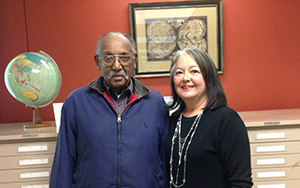UWM Geography Welcomes Audrey Kobayashi and Harold M. Rose

For our first spring 2014 Harold and Florence Mayer Lecture, we were honored not only to welcome distinguished geographer Audrey Kobayashi, but also to have present in our audience UWM Geography Professor Emeritus, Harold M. Rose. Dr. Rose’s foundational work on racial discrimination and segregation challenged urban geographers to consider the ghetto as produced through both spatial and social processes. His scholarship established that examining segregation was not just about mapping the distribution of racial groups across the urban landscape, but also about understanding the social processes and attitudes about race that produced those patterns.
Far ahead of what we, as a discipline, know today about the mass incarceration of African Americans and the state abandonment that has further entrenched racial and class segregation in cities, Professor Rose urged geographers to address the urgent social problems producing and reinforcing racialized urban geographies of despair and violence. The legacy of his work is paramount, and we were honored to announce the establishment of a new Harold M. Rose Lecture series that will emphasize topics of race and urban social justice, as a means to pay tribute to Professor Rose’s legacy to UWM Geography, to the University of Wisconsin-Milwaukee, and to the discipline of geography.
There are wonderful connections between Dr. Rose and our distinguished guest speaker, Audrey Kobayashi, whose scholarship has, in so many ways, contributed to understandings about race, racism, and anti-racism in geography. Professor Kobayashi joined us from Queen’s University in Kingston, Ontario. She has co-edited important books on peace and armed conflict, immigrants in North American cities, as well as publishing extensively within – and serving as editor and on the editorial boards of – the premier journals within human geography. Professor Kobayashi’s work has not only generated new theoretical approaches to race, anti-racist research, and pedagogy; it has also problematized the whiteness of the discipline and underscored the fundamental difference that race makes within the geographic enterprise. As someone working in the areas of critical geographies of race and feminist geography, I know I am just one of many, many scholars who can attest to the influence of Professor Kobayashi’s work on my own research and activism within geography. It was a true honor to have present with us two pioneering past-presidents of the AAG who have done so much to help us understand and challenge racism within and beyond the discipline.